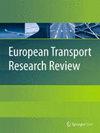通过数据驱动的人物和场景,整合城市交通设计的未来趋势和不确定性
IF 4.2
3区 工程技术
Q1 TRANSPORTATION
引用次数: 0
摘要
城市交通大大增加了温室气体排放,并给不同群体带来了负面的社会影响,例如获得机会或基本服务的机会有限。向可持续和以人为本的城市交通系统转型至关重要。然而,这也伴随着各种挑战。复杂的城市系统伴随着高度的不确定性(例如,技术进步、人口、气候变化),这些不确定性目前没有得到很好的整合。可能的解决方案源于设计、政策制定和创新,但由于方法不兼容,存在广泛的脱节。本文提出了一种方法,通过整合不同的方法来建模未来可能是什么以及谁可能是用户,从而提高设计未来城市交通系统的能力。研究的问题是如何将不同的未来用户需求整合到城市交通系统的设计过程中。拟议的基于场景的设计和人物角色允许创建数据驱动的原型人物角色-一组具有指定特征和行为的原型用户-测试其有效性,推导跨地理区域的分布,并将其转换为2030年不同的场景。这可以作为创建完整人物角色和合成人群的输入,作为设计师和模拟专家协作的中间设计对象。该方法在巴黎的背景下得到了典型的应用。它有助于城市交通解决方案的设计,使其更能意识到未来的不确定性和用户的多样化需求,从而更好地应对当今的挑战。该方法可以通过开放数据和可访问的源代码复制:https://github.com/TjarkGall/proto-persona-clustering。本文章由计算机程序翻译,如有差异,请以英文原文为准。
Integrating future trends and uncertainties in urban mobility design via data-driven personas and scenarios
Urban mobility contributes significantly to greenhouse gas emissions and comes with negative social impacts for various groups, such as limited accessibility to opportunity or basic services. Transitions towards sustainable and people-centred urban mobility systems are paramount. Yet, this is accompanied by various challenges. Complex urban systems are accompanied by high uncertainties (e.g., technological progress, demographics, climate change) which are currently not well integrated. Possible solutions originate from design, policymaking, and innovation, with a widespread disconnection due to non-compatible methods. This paper presents a method to improve the ability to design future urban mobility systems by integrating different approaches for modelling what the future could be and who could be the users. The research question is how diverse future user needs can be integrated in design processes for urban mobility systems. The proposed scenario-based design and personas allows to create data-driven proto-personas—a set of archetypical users with assigned characteristics and behaviours—test their validity, derive distributions across geographical areas, and transform them for different 2030 scenarios. This serves as input to create full personas and synthetic populations as intermediary design objects for the collaboration of designers and simulation experts. The methodology is exemplarily applied in the context of Paris. It contributes to urban mobility solution design that is more aware of future uncertainty and diverse needs of users, therefore, better capable to respond to today’s challenges. The approach is replicable with open data and accessible source code: https://github.com/TjarkGall/proto-persona-clustering .
求助全文
通过发布文献求助,成功后即可免费获取论文全文。
去求助
来源期刊

European Transport Research Review
Engineering-Mechanical Engineering
CiteScore
8.60
自引率
4.70%
发文量
49
审稿时长
13 weeks
期刊介绍:
European Transport Research Review (ETRR) is a peer-reviewed open access journal publishing original high-quality scholarly research and developments in areas related to transportation science, technologies, policy and practice. Established in 2008 by the European Conference of Transport Research Institutes (ECTRI), the Journal provides researchers and practitioners around the world with an authoritative forum for the dissemination and critical discussion of new ideas and methodologies that originate in, or are of special interest to, the European transport research community. The journal is unique in its field, as it covers all modes of transport and addresses both the engineering and the social science perspective, offering a truly multidisciplinary platform for researchers, practitioners, engineers and policymakers. ETRR is aimed at a readership including researchers, practitioners in the design and operation of transportation systems, and policymakers at the international, national, regional and local levels.
 求助内容:
求助内容: 应助结果提醒方式:
应助结果提醒方式:


